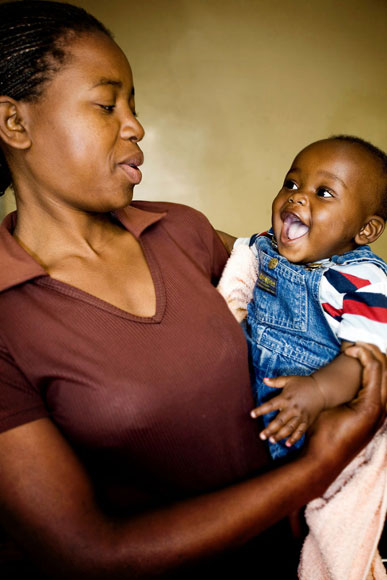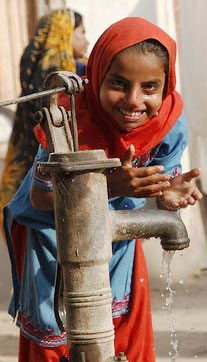
There is never a quiet moment in development, but the last nine months in DFID have been particularly intense. As will be apparent to anyone who reads the UK's Bilateral and Multilateral Aid Reviews, the amount of work that these represent has been staggering. However, given that together they form the basis on which we will allocate our aid over the next four years, they were not exercises to be taken lightly.
To give a snapshot of what was involved, for the Bilateral Aid Review, each DFID country team developed a 'results offer' for the next four years. These were scrutinised by over 100 internal technical reviewers and a panel of independent experts, which looked at issues including use of evidence, value for money and the focus on girls and women. In addition, in each country with a current bilateral programme, we also assessed whether the UK was best placed to make a long-term significant impact.
The Multilateral Aid Review assessed the performance of 43 organisations against a set of criteria, ranging from focus on poor countries, to transparency and accountability. The Review included country visits and multi-stakeholder inputs, and scrutiny by external experts. The criteria were brought together in two indices: one for contribution to UK development and humanitarian objectives, and one for organisational strengths. Put together, these were used to provide an assessment of value for money for UK aid, on which future funding decisions for individual agencies will be based.
Since (and even before) the Paris Declaration in 2005, we have all known that results matter, and have taken steps to focus programmes more on the results they achieve. But these reviews represent the first time that the UK has used results as a basis for our aid allocation. The results set out are ambitious, for example, schooling for 11m children, saving the lives of 50,000 women in pregnancy and childbirth, help 10m more women get access to modern family planning. Many of the results relate to better outcomes for girls and women - a particular priority that has been reflected in the allocations. A related, new priority for the Department is a significant uplift in our work on nutrition in a number of programmes (eg. Ethiopia, Zimbabwe, Burma) with a headline result of stopping 10m children going hungry.
Setting out the results in this way, together with the introduction of the Independent Commission for Aid Impact and the UK Aid Transparency Guarantee (including publishing every payment over £500 on our website), takes us to a new level of accountability to citizens in developing countries and in the UK. Debate in the UK in response to the Reviews has been welcome and robust and we expect it to continue over the next four years.

The results imperative has brought with it inevitable challenges. Of course, it is easier to measure children in school, or immunisations, than long-term improvements in governance and security. The reviews have many more numbers on what we will achieve through public service delivery than every other area of work. But as I hope is also clear, particularly in the country profiles of what we will do, it does not mean that we are moving away from working on the transformational issues. For example, we still have as top priorities "Promoting stability and strengthening accountability" in Kenya, and "Supporting economic stability, higher quality public spending and better growth" in Pakistan. We will continue to work on find ways of measuring success in how we are contributing to these priorities, but we will not be moving the focus away from what counts to what can be counted.
As a result of the Bilateral Aid Review, we will phase out programmes in 16 countries, in some cases up to 2016, and in all cases in a way that respects existing commitments. Whilst ending programmes has generated some adverse comment, in the current context the premium was on ensuring that our resources achieved the most significant impact. Our focus countries reflect the priority we place on investing in countries affected by fragility and conflict – increasing to 30% of our spend in 2014. Within these countries, our work will be clearly focused on meeting people’s needs, especially the poorest – for example delivering basic services to 1.8m people in Yemen or providing 1.5m people (over half of them women) with access to microfinance in Pakistan.
Through the Multilateral Aid Review, we now have a comprehensive overview of the strengths and weaknesses of the multilaterals that DFID funds. This gives us a sound basis on which to undertake future funding decisions to achieve the greatest possible impact. For each institution, it gives us a clear framework for how we can work together with the institution and with others to strengthen the impact of the whole multilateral system. For example with UNICEF, one of the top performers in the review, a significant increase in our support will be accompanied by working together on improving their leadership in key areas including humanitarian emergencies and showing leadership in the UN system on UN reform and Delivering as One.
Setting the results ahead of the programme delivery is a risky business. As the events in the Middle East demonstrate all too clearly, the context for development actors can change quickly, and we must not lose the flexibility and responsiveness that have been our strengths to date. We must also not shy away from innovative approaches for fear of failure. Our programmes already include piloting new approaches, such as "cash on delivery" and we will continue to seek, pilot and evaluate other innovative approaches. At the heart of our work will continue to be an ongoing dialogue with developing countries about what their priorities are, and a central focus on the underlying drivers of poverty in each context and globally.
We are in the privileged position of having significant amounts to invest. We have set out some of the results are those we expect to see from our investment, but we know that over the next four years plans may need to change and we will need an ongoing dialogue to explain and account for those.
Finally, I wanted to take this opportunity as I move on from DFID to say thank you to both the organisers of this blog and the participants in it. This is an incredibly interesting time for development and the changes in DFID that I have described above are examples of the innovation that is occurring in the field. Now more than ever we need great ideas for development!
Please note, this is a guest blog. Views expressed here do not necessarily represent the views of DFID or have the support of the British Government.

2 comments
Comment by Jiesheng Li posted on
The MAR highlighted the need for improvement for many International Organisations and agencies, but it quickly lumped all 43 organisations into one set of criteria, despite many of them having different structures and DFID not taking into account their expertise especially in light of the recent ME/North Africa crises.
Comment by Suparta posted on
is there any institutions that deal with the crisis of poverty, especially in Indonesia?